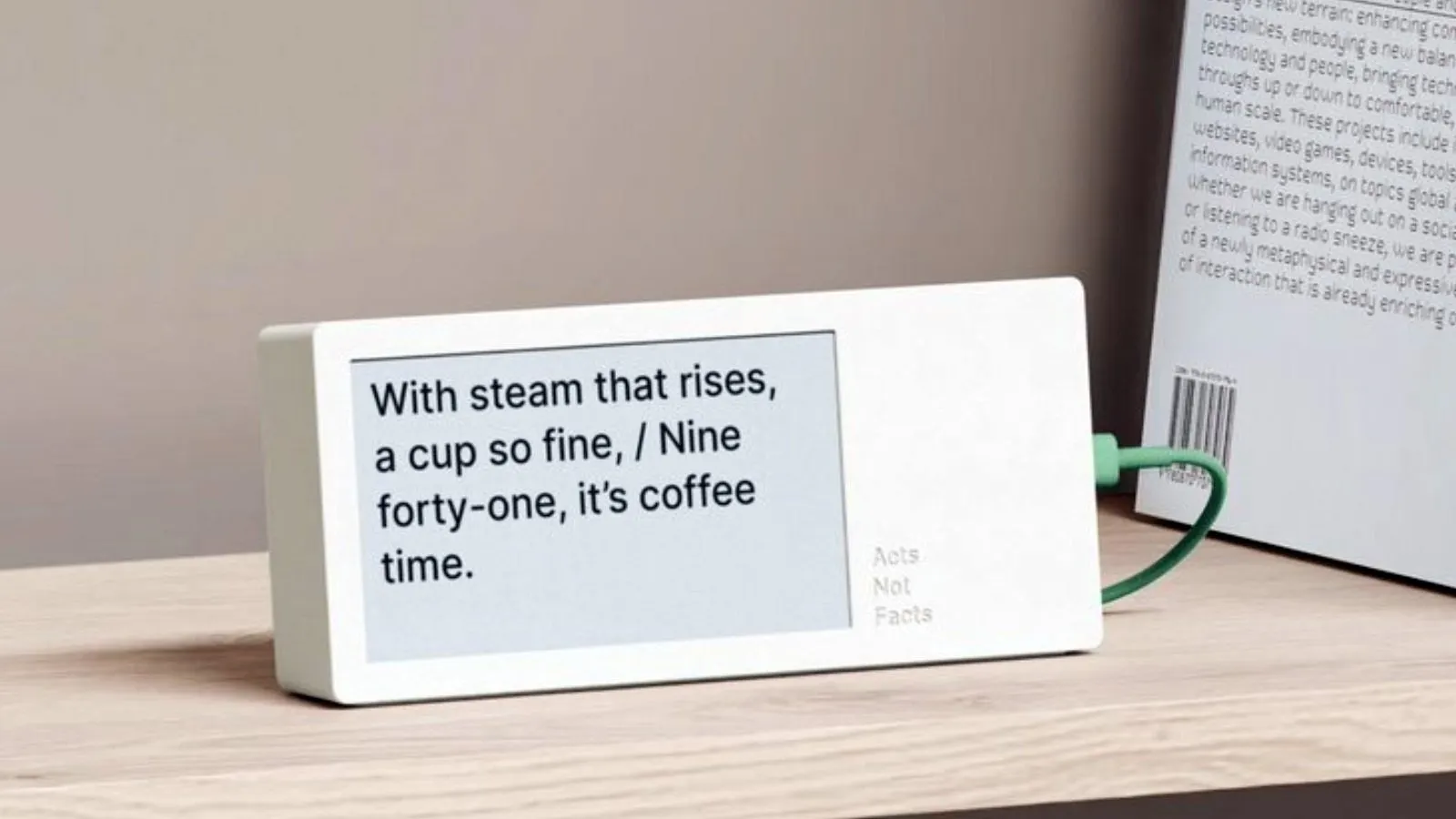A new project is using ChatGPT to publish whimsical rhymes in the form of a physical, digital clock. Designed to look at home on a desk or bedside table, Poem/1 is the brainchild of London-based technologist Matt Webb, who launched a Kickstarter campaign to fund the project.
Holding a master's degree in physics from Oxford University, Webb began the Poem/1 project last year. The idea, he said, came from his interest in technology integrated into everyday objects like alarm clocks.
“For a long time, I’ve been interested in ambient computing and what happens when our technology is around us, in our space, instead of demanding attention in our pockets,” Webb told Decrypt. “Simultaneously, I see more long-term potential in what I would call ‘embedded AI’ than agents.”
He continued: “Recently, I’ve been inventing AI for clients. I embrace playful experiments as a process, and I was using poems to demonstrate that there was ‘AI in the loop’ with a particular embedded app.”
“The two came together,” he recalled. “I put these AI poems on an e-ink screen I had on my bookshelves and just couldn’t stop laughing. Then I knew I had to make it.”
Webb said the initial project took twenty minutes to create using an e-paper display attached to a Raspberry Pi. Poem/1 uses an API connected to OpenAI’s ChatGPT to generate random poems.
“In the prototype, I used a Raspberry Pi,” Webb said. “But the problem with a Pi is it’s not easy to set up for end users, and also my prototype generated all the poems itself, which would be expensive for the end user, as well as resource intensive in aggregate.”
Notably, the so-called clock doesn’t display the time—at least, not with numerals—only time-related poetry drafted using ChatGPT. Poem/1 generates a new rhyme every minute that corresponds to the current time.
For example: "With hands on the clock. I'll show you the time. It's 3:50 PM. as the moments chime." Or, “With steam that rises, a cup so fine, Nine forty-one, it’s coffee time.”
Webb said he chose OpenAI’s generative AI model for its imagination, acknowledging that he has to remind the chatbot to include the time.
“Other models are getting close to the imaginative quality of ChatGPT but aren’t as reliable in terms of responding in a consistent machine-readable format,” he said. “They are prone to instruction drift, and that makes it harder to integrate them… while GPT-4 can compose better poems.
Or at least, it uses more $10 words,” he quipped. “But it’s more expensive, and that’s a factor too.”
As Webb explained, the production version of Poem/1 composes poems centrally and syndicates them out, adding the e-paper screen and wi-fi module are sourced from China, where manufacturing will occur.
At launch, the Poem/1 will only ship to the United Kingdom and the United States, but Webb said he may open shipping to other countries.
Webb said that one downside to using APIs this way is worrying about what happens if the company that runs the servers goes out of business. A more foundational problem Webb faces is with funding the project.
“With factory minimum order quantities, etc, I need to raise $100K to complete development and get the ball rolling,” Webb said on Twitter. “I'm not a deep pocketed VC-funded startup. So this is a lo-fi old-school campaign.”
Thanks partly to media coverage and social media buzz, Webb said more than 1,500 people have signed up for the Poem/1 waitlist. So far, 322 backers have pledged $44,107 with 29 days to go as of writing.
The Kickstarter for the project, Webb said, is set at $149 (about £119) plus shipping and import taxes, with an expected 10% increase in retail price after production. Noting strong community support, Webb said the campaign reached 40% of its funding goal within the first nine hours.
“I don’t take this for granted; I am extremely grateful and honored by the support and energy,” Webb said. “There’s still a way to go.”
Edited by Ryan Ozawa.
Daily Debrief Newsletter
Start every day with the top news stories right now, plus original features, a podcast, videos and more.

